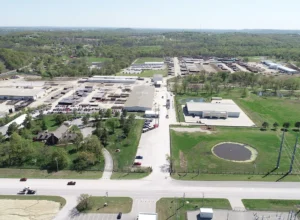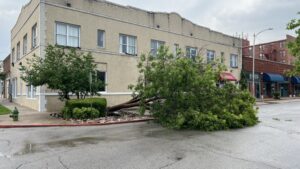Editor’s note: Please be aware that this is a developing story and subject to change. Keep up with all of our Coronavirus coverage at sapulpatimes.com/coronavirus
On Tuesday, March 24, 2020, Oklahoma Governor Kevin Stitt issued the 4th Amendment to his Executive Order which declared a State of Emergency due to the spread of COVID-19. Below is a summary of today’s Executive Order and Executive Memorandum filed by Governor Stitt.
The Memorandum gives some clarity to critical workforce employees and enforces the “Safer at Home” order statewide, requesting the elderly and individuals who are immuno-compromised or have pre-existing conditions to shelter in their homes, leaving only for essential needs like groceries or prescriptions, until April 30.
The memo also closes non-essential businesses that are in Oklahoma counties with confirmed cases of COVID-19. Businesses explicitly listed include hair salons, gyms, theaters, massage parlors, tattoo parlors, and museums. Restaurants may remain open in these counties but must close their dine-in areas, offering instead curbside pickup and delivery.
The businesses must come into compliance by midnight on March 25.
Elective surgeries, minor medical procedures, and non-emergency dental procedures are suspended beginning March 25 for the next two weeks to preserve medical supplies and PPE for COVID-19 response.
Gatherings of 10 or more individuals are prohibited and visitors at nursing homes, retirement, or long-term care facilities will be restricted.
The Order will impact the following Counties, subject to change:
- Canadian
- Cleveland
- Custer
- Garvin
- Grady
- Jackson
- Kay
- Logan
- Mayes
- McClain
- Muskogee
- Noble
- Oklahoma
- Pawnee
- Payne
- Pontotoc
- Tulsa
- Wagoner
- Washington
Editor’s note: Creek County is not listed here, but we’ve been told by multiple sources that Creek County now has several confirmed COVID-19 cases and will have to comply with Stitt’s order.
Businesses affected
In addition to those critical infrastructure sectors identified by USDHS, Stitt added these others:
Healthcare/Public Health:
- Workers providing COVID-19 testing; Workers that perform critical clinical research needed for COVID-19
- response
- Caregivers (e.g., physicians, dentists, psychologists, mid-level practitioners, nurses and assistants, infection
- control and quality assurance personnel, pharmacists, physical and occupational therapists and assistants,
- social workers, speech pathologists and diagnostic and therapeutic technicians and technologists)
- Hospital and laboratory personnel (including accounting, administrative, admitting and discharge, engineering,
- epidemiological, source plasma and blood donation, food service, housekeeping, medical records, information
- technology and operational technology, nutritionists, sanitarians, respiratory therapists, etc.)
- Workers in other medical facilities (including Ambulatory Health and Surgical, Blood Banks, Clinics, Community
- Mental Health, Comprehensive Outpatient rehabilitation, End Stage Renal Disease, Health Departments, Home
- Health care, Hospices, Hospitals, Long Term Care, Organ Pharmacies, Procurement Organizations, Psychiatric
- Residential, Rural Health Clinics and Federally Qualified Health Centers)
- Manufacturers, technicians, logistics and warehouse operators, and distributors of medical equipment,
- personal protective equipment (PPE), medical gases, pharmaceuticals (including materials used in
- radioactive drugs), blood and blood products, vaccines, testing materials, laboratory supplies, cleaning,
- sanitizing, disinfecting or sterilization supplies, and tissue and paper towel products
- Public health/community health workers, including those who compile, model, analyze and communicate
- public health information
- Blood and plasma donors and the employees of the organizations that operate and manage related activities
- Workers that manage health plans, billing, and health information, who cannot practically work remotely
- Workers who conduct community-based public health functions, conducting epidemiologic surveillance,
- compiling, analyzing and communicating public health information, who cannot practically work remotely
- Workers performing cybersecurity functions at healthcare and public health facilities, who cannot practically
- work remotely
- Workers conducting research critical to COVID-19 response
- Workers performing security, incident management, and emergency operations functions at or on behalf of
- healthcare entities including healthcare coalitions, who cannot practically work remotely
- Workers who support food, shelter, and social services, and other necessities of life for economically
- disadvantaged or otherwise needy individuals, such as those residing in shelters
- Pharmacy employees necessary for filling prescriptions
- Workers performing mortuary services, including funeral homes, crematoriums, and cemetery workers
- Workers who coordinate with other organizations to ensure proper recovery, handling, identification,
- transportation, tracking, storage, and disposal of human remains and personal effects; certify cause of death;
- and facilitate access to mental/behavioral health services to the family members, responders, and survivors of an incident
Law Enforcement, public safety, and first responders:
- Including front line and management, personnel including emergency management, law enforcement, Emergency Management Systems, fire, corrections, search and rescue, tactical teams including maritime, aviation, and K-9 units.
- Workers at Public Safety answering points.
- Fire mitigation activities.
- Private security, private fire departments, and private emergency medical services personnel.
- State and County workers responding to abuse and neglect of children, elders, and dependent adults.
- Animal Control Officers
Other Community-Based Government Operations and Essential Functions
- Faith-based services that are provided through streaming or other technology.
- Critical government workers as defined by the employer and consistent with their Continuity of Operations plans and Continuity of Government plans.
- Workers supporting public and private childcare establishments, pre-K establishments, K-12 schools, colleges, and universities for purposes of distance learning, provision of school meals, or care and supervision of minors to support essential workforce across all sectors.
This is a developing story and the list of qualified businesses is subject to change.










